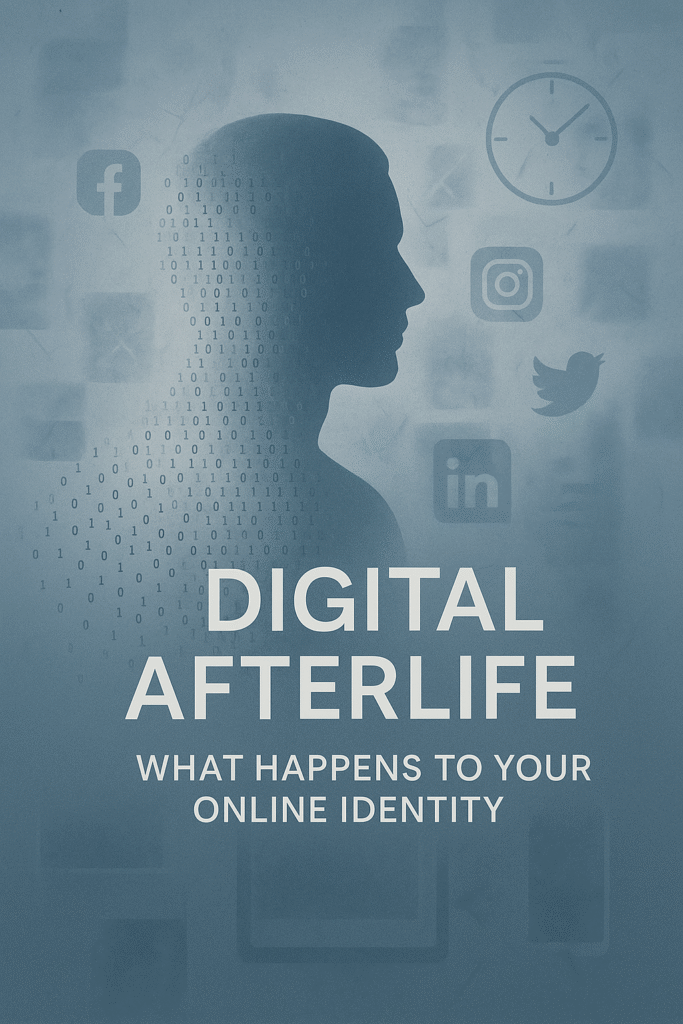
By Sandeep | Pulsewire Editorial Team
Updated: June 2025
Introduction: Your Digital Life Doesn’t Die with You
As our lives grow increasingly digital — from cloud storage and cryptocurrencies to Facebook posts and fitness trackers — we leave behind a vast digital footprint that persists long after death. But what becomes of these assets, accounts, and memories? Who owns your Instagram photos? Who can access your Gmail inbox? Welcome to the “digital afterlife”, a pressing issue at the intersection of technology, law, ethics, and grief.
This guide explores the evolving digital legacy landscape, platform-specific policies, Indian legal context, and what you can do now to manage your online presence after death.
The Expanding Digital Footprint
Most people think of their online presence as limited to social media. But by 2025, it includes:
- Financial & Payment Accounts: Paytm, Google Pay, UPI, online banking, trading apps.
- Subscriptions: Netflix, Amazon Prime, Microsoft 365, online news, streaming.
- Cloud Services: Google Drive, iCloud, OneDrive, Dropbox.
- Creative Work: Blogs, YouTube videos, websites, digital art portfolios.
- Gaming & Virtual Assets: Steam, PlayStation, in-game purchases.
- Medical Data: Online health portals, fitness apps (e.g., Fitbit, HealthifyMe).
- Cryptocurrency Wallets: Bitcoin, Ethereum, and other digital assets.
A 2024 report by Cyber Digital Index estimated that over 2.3 million Indians pass away annually with active digital accounts — many of which fall into legal limbo.
Platform Policies: How Major Tech Giants Handle Death
Each platform has a different approach to deceased users. Here’s an updated breakdown as of mid-2025:
Facebook & Instagram
- Memorialization: The account remains, labeled “Remembering.” No new friends, login, or content.
- Legacy Contact: Can pin posts, change profile picture, download permitted data. Cannot access messages or remove content.
- Deletion: Can be requested with proof of death.
📖 Facebook Memorialization Policy
📖 Instagram Deceased User Support
Google (Gmail, YouTube, Drive)
- Inactive Account Manager: Lets users choose a timeout period (3–18 months). Can notify up to 10 trusted contacts and grant access to specific services.
- Deletion Option: You can ask Google to delete your account if inactive.
📖 Google Inactive Account Manager
Apple (iCloud, iMessage, Photos)
- Digital Legacy Contact (Launched 2022): A person can be granted access using a legacy key and a death certificate.
- Limitations: Access limited to certain data; some encrypted data remains inaccessible.
X (formerly Twitter)
- No legacy features.
- Family can request deactivation with proof of death.
- No access to data or content.
- Family or colleagues can request account removal.
- No memorialization, no access granted.
📖 LinkedIn Deceased Member Form
Microsoft (Outlook, OneDrive)
- No formal digital legacy tools.
- Requires court order to access account data.
Legal & Ethical Challenges in India (2025 Update)
Indian Legal Status
- No Dedicated Digital Inheritance Law Yet.
- Courts refer to outdated laws like:
- Indian Succession Act, 1925
- Hindu Succession Act, 1956
- These laws cover physical and financial assets, not digital assets like social media or cryptocurrencies.
Terms of Service Conflict
- Most platforms state accounts are non-transferable.
- Even with a will, access is denied unless platform-specific tools (legacy contact, inactive manager) are set up.
Ethical Dilemmas
- Privacy of the Deceased: Should families read private messages?
- Consent & Memory: Should a dead person’s profile be memorialized or deleted?
- AI Deepfakes: Unauthorized use of voice, image, or likeness using generative AI raises serious posthumous misuse concerns.
Preparing Your Digital Legacy: What You Can Do Today
Taking proactive steps can ease the burden on loved ones and ensure your digital identity is handled respectfully.
✅ 1. Create a Digital Will vs. Letter of Instruction
- Digital Will: Legally binding but requires inclusion in an official will, which may still face ToS challenges.
- Letter of Instruction: Non-binding but practical; lists passwords, accounts, and wishes.
Tip: Store in a password-protected vault or share via a trusted executor.
✅ 2. Use Password Managers
Tools like 1Password, LastPass, or Bitwarden let you:
- Securely store all credentials.
- Share master access with a digital executor.
- Control account data in one place.
✅ 3. Set Up Platform Legacy Tools
- Facebook: Add a legacy contact.
- Google: Configure Inactive Account Manager.
- Apple: Assign Digital Legacy contact.
✅ 4. Appoint a Digital Executor
Someone you trust to:
- Handle account deletions or memorialization.
- Access approved data.
- Carry out your final online wishes.
✅ 5. Inventory Your Digital Assets
Maintain a record of:
- All online accounts.
- Cryptocurrency access keys.
- Domain names, blogs, or revenue-generating digital content.
- Subscriptions (cancel or transfer).
✅ 6. Explore Digital Legacy Services
Some tools help centralize management:
- Everplans
- Legacy Locker
- SafeBeyond
(Use cautiously — many are international and may not support Indian platforms yet.)
Why This Matters: The Cost of Inaction
Without a plan:
- Family may lose access to valuable digital memories.
- Online accounts may become targets for identity theft or misuse.
- Cryptocurrencies and financial assets may become permanently inaccessible.
Key Stats (2025)
- Over 70% of Indians under 45 have over 20+ online accounts.
- Only 3% have a documented digital legacy plan.
- Dormant social accounts expected to outnumber active users by 2070.
Sources & References
- Google Inactive Account Manager
- Facebook Memorialization Help
- Apple Digital Legacy
- Indian Succession Act, 1925 (gov.in)
- Bar & Bench Legal Analysis on Digital Wills
- [Cybersecurity India Journal – Digital Identity 2025]
- [LinkedIn & Twitter Help Centers]
- Research articles from the Indian Journal of Law & Technology
- TechCrunch: Digital Death 2024 Report
- The Hindu: Legal Vacuum in India’s Digital Estate Planning (2024)
About the Author
Sandeep is a digital ethics researcher and contributor at Pulsewire, focusing on data privacy, online identity, and the social-legal impact of technology in India. He regularly writes on cybersecurity, AI governance, and digital policy developments. This article is based on current platform policies, expert legal commentary, and international estate planning trends as of mid-2025.









